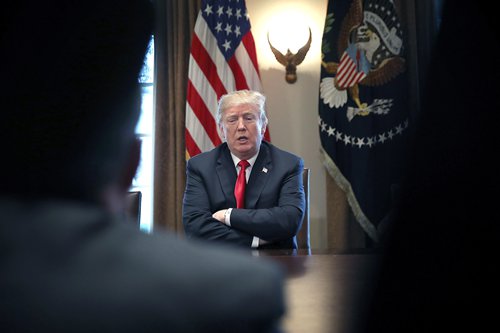Cooperation with other affected exporters possible

US President Donald Trump speaks at a meeting with leaders of the steel and aluminum industries at the White House in Washington, DC on Thursday. (Photo: VCG)
China might be seeking cooperation with the EU, Canada and others that have been impacted by US tariffs on steel and aluminum imports, according to a former senior trade official and several other experts on Monday.
Since US President Donald Trump announced a 25 percent tariff on steel imports and 10 percent on aluminum on Thursday, China has been relatively quiet on the issue compared with others such as the EU, which threatened retaliation. But the former official and experts urged the Chinese government to seek global cooperation in defending its interests.
"China should deal with this actively. It should not only tackle the issue itself, but should join with other 'victims' in appealing to the WTO to seek justice," Wei Jianguo, former vice commerce minister, told the Global Times on Monday.
"China is not only the largest victim of unfair global trade, but also the main target of this US protectionism. China is not the main target of these steel and aluminum tariffs, but if you lose your voice, then you lose friends and the best chance to counter," said Wei, who is currently the deputy director of the China Center for International Economic Exchanges (CCIEE). "We should not sit idly by just because the [impact] is small."
China's steel and aluminum exports to the US have dropped substantially in recent years due largely to various protectionist measures taken against Chinese companies, so the new tariffs will have a smaller impact on China than on the EU, Canada, South Korea and Brazil, according to industry experts.
In 2017, China's steel exports to the US stood at 1.18 million tons, down 78.15 percent from 2006, according to Wang Guoqing, director of Beijing Lange Steel Information Research Center, who cited Chinese customs data.
Exports to the US market only accounted for 1.57 percent of China's total steel exports in 2017, compared to 12.56 percent in 2006, Wang noted, adding that the decline was a result of rising US anti-dumping and countervailing measures since 2006.
"While the impact from the new tariff seems limited, the Chinese steel industry has been hurt badly by the US over the years," Wang told the Global Times on Monday. She also suggested that "China should definitely counter the US move."
Bai Ming, a research fellow at the Chinese Academy of International Trade and Economic Cooperation in Beijing, noted that many people "may think that the move does not affect China that much, but we have to be aware that the US has conducted several rounds of anti-dumping and anti-subsidy measures toward China's steel industry. So if we look at the larger picture, China has already suffered a lot."
Prepare for trade war
"We do not want a trade war but we should be prepared for one," Bai told the Global Times on Monday.
Xu Hongcai, an economist at the CCIEE, said that one way for China to respond would be to reduce imports from the US.
"For example, China is now importing a large amount of beef from the US, but we can import beef from other countries. It doesn't have to be from the US," Xu said.
But a more reasonable way to respond to the US move would be to work with other countries, the experts noted. The Trump administration will reportedly announce a detailed plan for the tariffs in the coming days.
"China should work together with other countries in the world to cope with the situation, and to reach a consensus on the tariff issue," Gao Liankui, a member of the Advisory Board of the Royal East and West Strategy Institute of Oxford University, told the Global Times.
The Chinese Ministry of Commerce (MOFCOM), in its only official response to the US measures so far, also alluded to cooperation with others.
"If the US' final measures hurt Chinese interests, China will join hands with other countries to take corresponding measures to defend its interests," Wang Hejun, head of the trade remedy and investigation bureau of MOFCOM, said in a statement on Friday.
However, recent media reports suggested that some countries such as the UK and Canada as well as US politicians are urging the US government to reconsider the plan and possibly give exemptions for US allies. US officials have so far reportedly said there will not be exemptions for any country.
Still, Wei, the former top trade official, said that China and these countries "can definitely cooperate."


